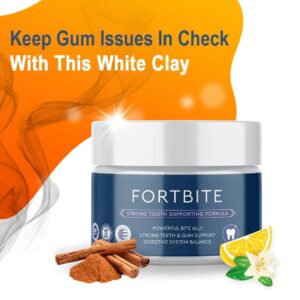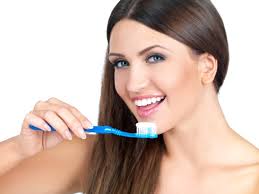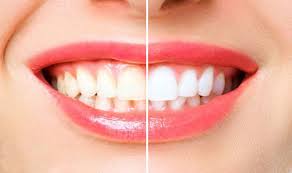How can I remove tartar from my teeth at home?
Tartar, also known as dental calculus, is a hard, calcified deposit that forms on your teeth when plaque (a soft, sticky film of bacteria) is not properly removed through regular oral hygiene practices. Tartar can contribute to gum disease and other oral health issues, so it’s important to address it. While professional dental cleanings by a dentist or dental hygienist are the most effective way to remove tartar, there are some home care strategies you can use to help manage it:
- Regular Brushing: Brush your teeth thoroughly at least twice a day with fluoride toothpaste. Use a soft-bristle toothbrush and be sure to brush all surfaces of your teeth, including the front, back, and chewing surfaces.
- Floss Daily: Flossing helps remove plaque and food particles from between your teeth and along the gumline, where tartar often forms. Be gentle when flossing to avoid damaging your gums.
- Use an Antiseptic Mouthwash: Rinse with an antiseptic or antibacterial mouthwash to help reduce bacteria in your mouth. Look for products that are recognized by dental associations for their effectiveness.
- Electric Toothbrush: Consider using an electric toothbrush, which can be more effective at removing plaque compared to manual brushing.
- Tartar-Control Toothpaste: Some toothpaste products are specifically formulated to help control tartar. They often contain ingredients like pyrophosphate or zinc citrate.
- Avoid Smoking and Limit Alcohol: Smoking can contribute to tartar buildup, so quitting or reducing tobacco use is beneficial. Excessive alcohol consumption can also contribute to oral health issues, so moderate or eliminate alcohol consumption if possible.
- Chew Sugarless Gum: Chewing sugarless gum after meals can help stimulate saliva production, which can aid in neutralizing acids and removing food particles.
- Limit Sugary and Starchy Foods: Reducing your intake of sugary and starchy foods can help prevent plaque buildup, which can eventually harden into tartar.
- Stay Hydrated: Drink plenty of water throughout the day to help rinse away food particles and bacteria.
- Professional Dental Cleanings: Schedule regular dental check-ups and professional cleanings. A dentist or dental hygienist can remove tartar that cannot be effectively addressed through home care alone.
It’s important to note that while these home care strategies can help manage tartar, they may not completely eliminate it once it has formed. Stubborn tartar deposits require professional removal by a dental professional. Regular dental visits are crucial for monitoring your oral health and addressing any tartar buildup promptly. If you have concerns about tartar or your oral hygiene routine, consult with your dentist or dental hygienist for personalized guidance.
Can lemon remove tartar?
Lemon juice is often touted for its natural cleaning properties, but it’s not a recommended or effective method for removing tartar (dental calculus) from your teeth. In fact, using lemon juice to try to remove tartar can have negative consequences for your oral health. Here’s why:
- Acidic Nature: Lemon juice is highly acidic due to its citric acid content. Acidic substances can erode tooth enamel, which is the protective outer layer of your teeth. Continuous exposure to acidic substances can weaken the enamel and make your teeth more susceptible to damage and decay.
- Tartar is Hardened Plaque: Tartar is not simply a stain on your teeth; it’s a hardened deposit of mineralized plaque. Plaque is a sticky film of bacteria that forms on your teeth, and when it’s not adequately removed through regular oral hygiene practices like brushing and flossing, it can harden into tartar. Lemon juice is not effective at breaking down or dissolving this hard deposit.
- Increased Sensitivity: The acid in lemon juice can make your teeth more sensitive. If you have exposed dentin (the layer beneath the enamel) due to gum recession or tooth erosion, lemon juice can worsen sensitivity and discomfort.
Instead of using lemon juice to remove tartar, it’s essential to follow established oral hygiene practices, which include:
- Brushing your teeth thoroughly with fluoride toothpaste at least twice a day.
- Flossing daily to remove plaque and food particles from between your teeth and along the gumline.
- Visiting your dentist regularly for professional dental cleanings and check-ups. A dental professional can safely and effectively remove tartar using specialized instruments.
If you’re concerned about tartar buildup or have questions about your oral hygiene routine, consult with your dentist or dental hygienist. They can provide personalized recommendations and treatments to address your specific oral health needs.
What kills tartar on teeth?
Tartar, also known as dental calculus, is a hardened deposit of mineralized plaque that forms on teeth. Once tartar has developed, it cannot be effectively removed at home through regular brushing and flossing. Professional dental cleanings by a dentist or dental hygienist are the most effective way to remove tartar. However, there are some steps you can take to help prevent tartar buildup and control it:
- Maintain Good Oral Hygiene: Regular and thorough oral hygiene practices can help prevent the formation of tartar. This includes brushing your teeth at least twice a day with fluoride toothpaste and using dental floss to clean between your teeth and along the gumline daily.
- Use Tartar Control Toothpaste: Some toothpaste products are formulated with ingredients like pyrophosphate or zinc citrate, which can help reduce tartar formation. Look for toothpaste labeled as “tartar control” or “anti-tartar.”
- Electric Toothbrush: Consider using an electric toothbrush, which can be more effective at removing plaque and preventing tartar buildup compared to manual brushing.
- Mouthwash: Use an antiseptic or antibacterial mouthwash as part of your oral hygiene routine. These products can help reduce bacteria in your mouth, which can contribute to tartar formation.
- Chew Sugarless Gum: Chewing sugarless gum after meals can help stimulate saliva production, which can aid in neutralizing acids and rinsing away food particles.
- Limit Sugary and Starchy Foods: Reducing your consumption of sugary and starchy foods can help prevent plaque buildup, which can eventually harden into tartar.
- Professional Dental Cleanings: Schedule regular dental check-ups and professional cleanings. A dentist or dental hygienist can safely and effectively remove tartar deposits using specialized instruments.
- Dental Scaling: For individuals with a history of tartar buildup, more frequent dental scaling and root planing procedures may be recommended by a dentist or periodontist. This involves the removal of tartar and plaque from below the gumline.
- Stay Hydrated: Drinking plenty of water throughout the day can help rinse away food particles and bacteria, reducing the risk of plaque and tartar formation.
It’s important to remember that tartar can only be removed by a dental professional. Therefore, if you already have tartar buildup, it’s crucial to schedule a dental cleaning to have it safely and effectively removed. Regular dental visits and a consistent oral hygiene routine are key to preventing tartar buildup and maintaining good oral health.
What is a simple trick to remove tartar?
Removing tartar (dental calculus) is not a simple task that can be accomplished with a “trick” at home. Tartar is a hardened deposit of mineralized plaque that forms on teeth, and once it has developed, it cannot be effectively removed through DIY methods. Tartar removal requires professional dental treatment provided by a dentist or dental hygienist.
Here’s why it’s essential to seek professional dental care for tartar removal:
- Hardened Deposits: Tartar is firmly attached to the tooth surface and is resistant to regular brushing and flossing. Home remedies or tricks are not effective in breaking down or removing tartar.
- Specialized Instruments: Dental professionals use specialized instruments, such as scalers and ultrasonic devices, to safely and effectively remove tartar without damaging the tooth’s enamel or causing injury to the gums.
- Comprehensive Cleaning: Professional dental cleanings not only remove tartar but also address plaque buildup, bacteria, and stains that contribute to oral health problems.
- Oral Examination: During a dental cleaning, the dentist or dental hygienist can also assess the overall health of your mouth, identify any dental issues, and provide recommendations for preventive care and treatment.
If you’re concerned about tartar buildup or have noticed any signs of gum disease (such as bleeding gums, bad breath, or gum recession), it’s important to schedule a dental appointment for a thorough examination and professional cleaning. Regular dental check-ups, typically recommended every six months, can help prevent tartar buildup and maintain good oral health.
While you cannot remove tartar at home, you can take steps to prevent its formation by maintaining a consistent oral hygiene routine, including brushing your teeth, flossing daily, and using tartar-control toothpaste. Additionally, limiting sugary and starchy foods and beverages can help reduce plaque formation, which is the precursor to tartar.
Is tartar on teeth normal?
Tartar, also known as dental calculus, is not normal or desirable on teeth. Tartar is a hardened deposit of mineralized plaque that forms on teeth when plaque (a soft, sticky film of bacteria) is not adequately removed through regular oral hygiene practices. While plaque can be managed and removed with proper brushing and flossing, tartar is a more advanced and stubborn stage of oral hygiene neglect.
Here’s why tartar is not considered normal:
- Oral Health Consequences: Tartar buildup can lead to various oral health issues, including gum disease (gingivitis and periodontitis), cavities, and tooth decay. These conditions can cause discomfort, pain, and tooth loss if left untreated.
- Cosmetic Concerns: Tartar deposits can also cause visible discoloration or staining on teeth, affecting the appearance of your smile. This can be a cosmetic concern for many people.
- Contributing Factors: The formation of tartar is often associated with poor oral hygiene habits, infrequent dental check-ups, and certain risk factors like smoking, poor diet, or medical conditions that affect saliva production.
- Preventable: Tartar buildup is entirely preventable with good oral hygiene practices. Regular brushing, flossing, and professional dental cleanings are effective in preventing and managing tartar.
To maintain good oral health and prevent tartar buildup:
- Brush your teeth thoroughly at least twice a day with fluoride toothpaste.
- Floss daily to remove plaque and food particles from between your teeth and along the gumline.
- Use tartar-control toothpaste if recommended by your dentist.
- Limit sugary and starchy foods and beverages.
- Visit your dentist for regular check-ups and professional cleanings (typically recommended every six months).
If you suspect you have tartar buildup or are experiencing symptoms of gum disease, such as bleeding gums or bad breath, it’s crucial to schedule a dental appointment. A dentist or dental hygienist can assess your oral health, remove tartar, and provide guidance on maintaining a healthy smile.
Why am I getting so much tartar?
Excessive tartar buildup can be caused by a combination of factors related to your oral hygiene practices, diet, genetics, and overall health. Understanding these factors can help you address the issue and take steps to reduce tartar formation. Here are some common reasons why you may be experiencing significant tartar buildup:
- Poor Oral Hygiene Habits: Inadequate brushing and flossing can lead to the accumulation of plaque on your teeth. Plaque, if not removed regularly, can harden into tartar over time.
- Irregular Dental Check-Ups: Skipping or delaying dental check-ups and professional cleanings allows plaque to accumulate and turn into tartar. Regular dental visits are essential for tartar removal and early detection of oral health issues.
- Dietary Choices: Consuming a diet high in sugary and starchy foods promotes the growth of bacteria in your mouth, leading to increased plaque formation. Plaque is the precursor to tartar.
- Dry Mouth: A dry mouth (xerostomia) can contribute to tartar buildup because saliva helps neutralize acids, rinse away food particles, and prevent plaque from hardening into tartar. Certain medications, medical conditions, or breathing through the mouth can cause dry mouth.
- Tobacco Use: Smoking or using tobacco products can increase the risk of tartar buildup, gum disease, and other oral health problems.
- Genetics: Some individuals may be genetically predisposed to produce more plaque or have other factors that increase their susceptibility to tartar formation.
- Age: As people age, they may be more prone to tartar buildup, partly due to changes in oral health habits or other factors related to aging.
- Medical Conditions: Certain medical conditions, such as diabetes or autoimmune diseases, can increase the risk of gum disease and tartar formation.
To reduce tartar buildup:
- Maintain a consistent and thorough oral hygiene routine by brushing your teeth at least twice a day with fluoride toothpaste and flossing daily.
- Use tartar-control toothpaste if recommended by your dentist.
- Limit sugary and starchy foods and opt for a balanced diet rich in fruits, vegetables, and lean proteins.
- Stay hydrated by drinking plenty of water to help maintain saliva production.
- Avoid smoking and tobacco use.
- Attend regular dental check-ups and professional cleanings as recommended by your dentist.
- Discuss any dry mouth symptoms or medical conditions with your healthcare provider and dentist for appropriate management.
If you’re experiencing excessive tartar buildup or have concerns about your oral health, it’s essential to consult with your dentist. They can assess your specific situation, provide personalized recommendations, and address any underlying issues contributing to tartar formation.
Is tartar permanent?
Tartar, also known as dental calculus, is not permanent in the sense that it cannot be removed. However, once tartar has formed on your teeth, it cannot be removed by regular brushing and flossing at home. Tartar is a hardened deposit of mineralized plaque that adheres tightly to tooth surfaces and can only be effectively removed through professional dental cleaning by a dentist or dental hygienist.
Here’s what you need to know about tartar:
- Formation: Tartar develops when plaque, a soft, sticky film of bacteria, is not adequately removed from teeth. Over time, the minerals in your saliva can cause plaque to harden into tartar.
- Hardened Deposit: Tartar is a hard and crusty substance that firmly attaches to the tooth’s surface, including both the crown and below the gumline.
- Removal: Regular brushing and flossing can help prevent the formation of tartar by removing plaque, but once tartar has formed, it requires professional intervention.
- Professional Cleaning: Dentists and dental hygienists use specialized instruments and techniques to safely and effectively remove tartar during professional dental cleanings. These instruments are designed to scrape away the hardened deposits without damaging the tooth’s enamel.
- Importance of Removal: Tartar removal is essential for maintaining good oral health. If left untreated, tartar buildup can lead to gum disease, tooth decay, and other oral health problems.
- Regular Check-Ups: Regular dental check-ups (typically every six months) are crucial for monitoring your oral health and ensuring that any tartar buildup is promptly addressed.
While tartar is not permanent in the sense that it can be removed, it does require professional attention for effective removal and prevention of associated oral health issues. If you suspect you have tartar buildup or are due for a dental cleaning, schedule an appointment with your dentist. They can assess your oral health, remove tartar as needed, and provide guidance on maintaining good oral hygiene practices.
Does tartar damage teeth?
Yes, tartar (also known as dental calculus) can damage teeth and negatively affect your oral health. Here are some ways in which tartar can harm your teeth:
- Gum Disease: Tartar is a hard and rough deposit that forms on teeth when plaque (a soft, sticky film of bacteria) is not adequately removed. The bacteria in tartar can irritate and inflame the gums, leading to gum disease. Gingivitis, the early stage of gum disease, often causes symptoms such as redness, swelling, bleeding gums, and bad breath. If left untreated, gum disease can progress to more severe forms, including periodontitis, which can result in gum recession, pocket formation, and tooth loss.
- Tooth Decay: The bacteria in tartar produce acids that can erode tooth enamel and lead to tooth decay (cavities). This is particularly problematic if tartar forms in areas where the toothbrush cannot effectively reach, such as between teeth or below the gumline.
- Tooth Sensitivity: Tartar buildup can contribute to tooth sensitivity, as it exposes the vulnerable parts of the teeth, such as the dentin, to external stimuli like hot and cold temperatures.
- Cosmetic Issues: Tartar deposits can cause visible staining or discoloration on teeth, affecting the aesthetics of your smile.
- Tooth Mobility and Loss: In advanced cases of gum disease associated with tartar buildup, the supporting structures of teeth, including the bone, can become compromised. This can lead to tooth mobility (teeth becoming loose) and, in severe cases, tooth loss.
To prevent tartar-related damage to your teeth and gums:
- Maintain good oral hygiene practices, including brushing your teeth at least twice a day with fluoride toothpaste and flossing daily.
- Use tartar-control toothpaste if recommended by your dentist.
- Limit your consumption of sugary and starchy foods and beverages, as they can contribute to plaque formation (the precursor to tartar).
- Avoid smoking and tobacco use, which increase the risk of tartar buildup and gum disease.
- Schedule regular dental check-ups and professional cleanings (usually recommended every six months). Dental professionals have the tools and expertise to remove tartar safely and assess your oral health for early signs of gum disease.
If you suspect you have tartar buildup or are experiencing symptoms of gum disease (such as bleeding gums, bad breath, or gum recession), it’s crucial to consult with your dentist promptly. Early intervention and professional dental cleanings can help prevent further damage to your teeth and gums.







